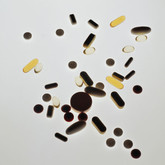Generics
Also noted on generics: 22 March 2012
Watson confirms patent challenges
Watson Pharmaceuticals (Watson) confirmed that lawsuits had been filed against the generics company regarding two Abbreviated New Drug Applications it had submitted to FDA.
Forest Laboratories filed a lawsuit against Watson on 13 March 2012 to try to prevent a generic version of Bystolic (nebivolol) used for treatment of hypertension, until the ‘040’ patent that Forest licenses from Janssen Pharmaceutica expires in December 2021.
Abbott Laboratories filed a lawsuit against Watson on 16 March 2012 to prevent commercialisation of a generic version of Niaspan (Niacin) extended release tablets until the ‘428’ and ‘035’ patents expire in September 2013.
Source: Watson
Cost savings due to prescribing of generic PPIs and statins in Scotland
Significant cost savings can be made by governments by encouraging prescribing of generics rather than brand-name drugs. In Scotland, in an effort to control medicines expenditure, measures were introduced in 2000 to encourage the prescribing of generic proton pump inhibitors (PPIs) and statins [1].
Generics reach 80% and play a critical role in reducing costs
Prescription drug spending in the US reached US$307 billion in 2010–an increase of US$135 billion since 2001–and comprised approximately 12% of all healthcare spending in the country, according to a report published on 31 January 2012 by the US Government Accountability Office (GAO).
First generic atorvastatin launched in Australia and Europe
On 6 March 2012, Ranbaxy announced that it had obtained, pursuant to a settlement agreement with Pfizer, the rights to an early entry of its generic atorvastatin in Germany, Italy, The Netherlands and Sweden.
Indian Government issues first compulsory licence
The Indian Government has issued a compulsory licence for the first time, allowing India-based drugmaker Natco Pharma (Natco) to launch a generic version of Bayer’s liver and kidney cancer drug Nexavar (sorafenib) before the patent expires on the originator.
Also noted on generics: 16 March 2012
Prescription drugs to be directly dispensed by pharmacists
FDA has announced a meeting to be held on 22 and 23 March 2012 to discuss the possibility of allowing some prescription drugs to be dispensed by pharmacists without the need for a physician’s prescription.
Source: Federal Register
Data publication may address generics misperceptions
Wider publication of bioequivalence, safety, or efficacy data to demonstrate the effectiveness of generic drug compounds may help to nullify the last remaining anti-generics argument: that generics do not achieve the same therapeutic standards as the original branded drug.
Generics saved Germany more than 25% in 2011
The increased use of generics in Germany has brought about record savings of more than 25% in 2011 compared with 2010. The increased savings have been attributed to the success of measures put in place by the German Government to encourage generics substitution and competition in the public health insurance funds off-patent market.
Savings to be made from generics use in Australia
Increasing the use of generic drugs in Australia could generate ‘hundreds of millions of dollars in savings’ for Australia’s Pharmaceutical Benefits Scheme (PBS) in 2012 [1], ‘eliminating the need for further PBS cuts’, according to Australia’s Generic Medicines Industry Association (GMiA).
Impact of measures to encourage generics prescribing in Scotland
Since 2000, measures have been introduced in Scotland in order to encourage use of generic rather than brand-name proton pump inhibitors (PPIs) and statins [1]. The impact of these measures on the prescribing practices in Scotland has been positive. Generics use has increased, and costs for the Scottish government have decreased.











